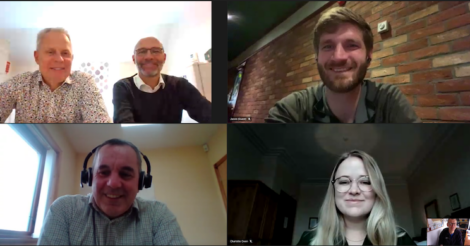Energy / Rural district heating schemes a step closer following visit of Danish delegation
THE IDEA of creating a Shetland-wide district heating task force to help to understand its potential for decarbonising heating and better plan future developments has been floated following a visit of a group of Danish experts to the isles.
Denmark is widely seen as the world leader in harnessing excess heat and surplus energy to heat homes and business premises.
The country, which has a similar population as Scotland, is home to around 400 district heating companies, providing domestic heating to 66 per cent of Danish households.
By law they are now tasked to connect as many additional households as possible to help make the country independent from Russian gas imports.
Lerwick’s own district heating system, which had its first customers connected 24 years ago, is based on a scheme on the Danish island of Bornholm.
This week, a delegation of Danish energy experts visited the isles to meet with business and local authority representatives as part of a wide-ranging mentoring programme on the role district heating could play in the journey to net zero.
With 20 per cent of the country’s greenhouse gas emissions coming from heating buildings, Scotland is keen to see more low carbon heat networks created, and has set a target of providing 35 per cent of domestic and 70 per cent of non-domestic buildings with low carbon heat by 2032.
Morten Stobbe, vice president of Veks, the company that provides district heating to most of Copenhagen, said a dedicated heat task force would help to better understand what district heating could do to “decarbonise if not Shetland then at least Lerwick”.
Become a member of Shetland News
His colleague Morten Duedhal, of the Danish District Heating Association, added that Shetland was already in a good position and had significant potential to use existing and future energy generation to expand the existing network in Lerwick and potentially build new ones in rural parts of the isles.
However, key to achieving better integration of different energy sectors and thus benefits for everybody would require more and better co-operation to “breaking down the silo approaches”, according to Charlotte Owen, the principal energy policy advisor at the Danish embassy in London.
“The best heat networks are those that really understand the local context; so the more talking and the more co-operation the better,” she said, adding that, for example, any future hydrogen production should incorporate the option of providing a nearby housing estate with waste heat.
Manager of the Lerwick district heating company SHEAP Derek Leask said that in his mind the delegation’s visit has brought the creation of smaller heat networks in Shetland’s rural areas a step closer.
“District heating helps Shetland as a whole because we pay around one million pounds to the SIC for the heat they generate through burning everybody’s waste. So if we wouldn’t do that, everybody’s council tax would be a bit higher,” he said.
“I am acutely aware of the reaction to district heating in rural areas. One of the interesting things that has come out of this visit is the awareness that there are 400 such schemes in Denmark, and many are what you could call micro district heating schemes serving 100 or 200 houses.
“There is definitely potential in Shetland for doing something in rural areas with heat networks.
“Through co-operation with all the other stakeholders in the energy sector we could become more heat oriented, and also looking at the possibility of heat networks in rural areas. I think there’s a much greater possibility after this visit than it was before.”
Become a member of Shetland News
Shetland News is asking its readers to consider paying for membership to get additional perks:
- Removal of third-party ads;
- Bookmark posts to read later;
- Exclusive curated weekly newsletter;
- Hide membership messages;
- Comments open for discussion.
If you appreciate what we do and feel strongly about impartial local journalism, then please become a member of Shetland News by either making a single payment, or setting up a monthly, quarterly or yearly subscription.




































































